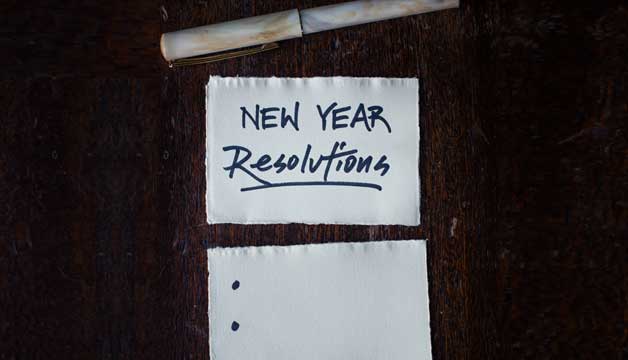To be honest, I am not a huge fan of New Year’s resolutions. Not because I don’t like the idea of resolutions, but rather because they don’t usually work.
Therefore, I prefer to use the New Year as an opportunity to reflect on the year past and to look ahead to the year to come.
In this way, you can assess changes that you might like to make and goals that you might like to achieve without feeling as though you must make enormous life changes.
That is actually exactly why most New Year’s resolutions fail. People try to change too much too fast. They get overwhelmed and tired, and they quickly return to their old way of doing things.
So here are three things that I suggest when it comes to New Year resolutions:
Start Small
You’re not going to change everything overnight, and you don’t have to. Rather than setting out to lose 20 pounds, perhaps a more realistic goal is to walk for 10 minutes every day or to eat one serving of vegetables with every meal.
Once you make one small change, it is easier to make another small change. Over time, lots of small changes add up to big results.
Choose A Goal That Is Meaningful
The world is full of “shoulds,” and there is always more that we could be doing and having. But just because the world is telling us that we should want, that we should have, that we should be more doesn’t mean that these lofty goals align with our own personal values.
So figure out a resolution that is meaningful to you for more than just superficial reasons. Try spending more quality time with your kids to improve your relationship. Or maybe spend more personal time so that you’re more clear on your own values and priorities. Just getting more sleep so that you are happier and healthier could be the best thing you could do for yourself, your work, and your family.
Whatever you choose, make sure that it is motivated by something that matters to you because you’ll be far more inclined to stick to it.
Make Your Resolution A Priority
Change is the result of deliberate effort. By setting a goal that you’re not willing to see through, you are setting yourself up for failure and disappointment. This can lead to self-defeat and discouragement, which may serve to perpetuate old habits and destructive cycles.
So don’t put yourself in that position.
Instead, ask yourself if you are willing to do what it takes to reach your goal before you make any promises.
If you are, figure out the plan and stick to it. If not, find something else to focus on.
Stick With It
If you do decide to commit to something small and meaningful, and you continue to make it a priority, you’ll still need to manage your expectations.
If you are being honest with yourself and sticking to the plan, you will inevitably see results. They may not come as fast as you would like, but don’t give up. Change often takes longer than we would like.
If you continue for a month or so and nothing external changes, you can revise the plan as necessary. But maybe it won’t be necessary.
You just may find that what you were seeking all along was the internal implementation of a positive change. By cultivating new habits and ways of being, you may find that external outcomes just aren’t as important after all.

